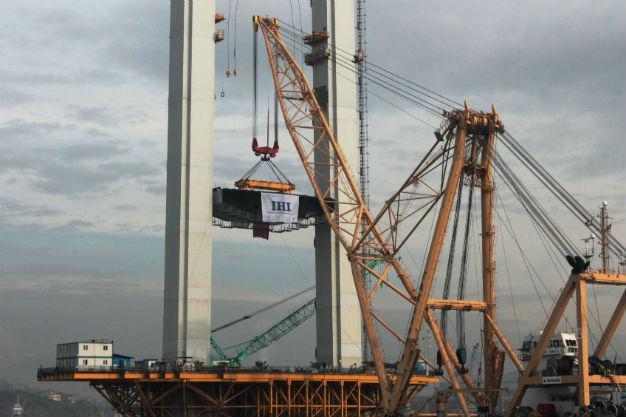Turkish construction sector expects ‘dark days abroad’ amid Russia crisis, oil plunge
ISTANBUL

CİHAN photo
The Turkish Contractors’ Association (TMB) has said it expects a further slowdown in the construction business due to a rise in geopolitical risks, including deteriorating ties with Russia and economic problems in major Turkish markets that are dependent on oil revenue.“The oil plunge will negatively affect the feasibility of some major construction projects abroad and trigger global competitiveness further. These dynamics have directed Turkish contractors to seek new markets,” the TMB said Feb. 1 in its first-quarter projection report.
The largest markets for Turkish contractors last year were Russia, with a share of around 26 percent; Kuwait at 22.4 percent; Turkmenistan at 16.3 percent; Algeria at 10.8 percent and Saudi Arabia at 5.3 percent, according to TMB data.
Turkish contractors took on a total of 8,662 projects worth $322 billion in 107 countries between 1972 and the end of 2015, said the association.
Sector eyes new markets
“In order to recover potential losses in Libya, Iraq and Russia, all of which constitute over 36 percent of Turkey’s foreign construction services, potential opportunities have been seen in new markets, mainly in Sub-Saharan Africa, Latin American countries and Iran,” said the report.
Global markets have started to price in escalating geopolitical risks that are comprised by rising tensions between Iran and Saudi Arabia, the refugee influx from Syria to Europe and terror attacks, among others.
The changing dynamic of the global economy in the aftermath of the U.S. Federal Reserve’s decision to hike interest rates has also created additional pressure on emerging markets in particular, including Russia, China and Brazil, making global investors much more selective in the projects they choose to undertake, said the association.
Inside Turkey, infrastructure projects are expected to continue, including port, high-speed train, subway and highway developments, as well as integrated health campus projects and urban transformation projects.
“It will be of great importance to see the realization of an effective economic and social reform agenda and the maintenance of a healthy investment climate by the new government in the upcoming period so as to enable the sector to recover, infrastructure projects to continue and international capital to flow into the country,” said the report.
















